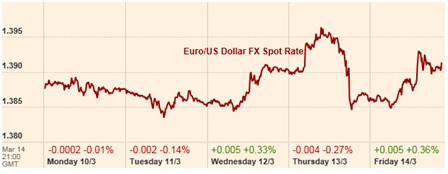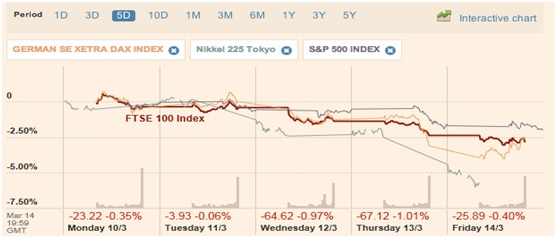[edmc id=1554] [/edmc]
[/edmc]
U.S.
At the end of a week dominated primarily by uncertainty, markets mostly closed in negative territory.
Signs of the week that’s past can be clearly seen in the VIX index which has been on a constant hike path since the beginning of 2014. The VIX is seen as the “Fear Gauge”, meaning that it represents uncertainty and future volatility in the markets; the higher the reading, the higher the concern.
Fueled demand for havens led investors to move upon more solid grounds such as the yen and treasury debt. The yield in 10-year Government bonds lowered by 14 bps over the week, and so did the currency w.r.t. the yen by another 1.8 %. All of this ahead of Sunday’s Referendum in Crimea that will decide if Crimean people want to be annexed by Russia (In this regard, we link you to this week’s article on the Ukrainian situation). A possible outcome is likely to be positive for Russian self-esteem but negative for world stability, we all know that. So when markets open on Monday it will be likely that the U.S. will undertake strict measures in order to sanction Russia’s actions. We believe what we have seen in equity markets this past week may stretch to the next 2 weeks as no signs of improvement of the conflict can be seen on the horizon.
Euro zone
The trading week that has just passed ended in negative territory on Friday for European stocks, as the FTSE Eurofirst 300 fell 0.7 per cent to reach a loss of just over 3 percentage points for the whole week. The main concerns were coming from reiterated signs of growth slowdown in China and from the risk of confrontation in Ukraine. National equity indices did not fare differently, with the German DAX losing the same as the Eurofirst 300 and the Italian FTSE MIB losing less at -1.39% over the week, the latter partly spurred by internal political developments and by positive data on industrial production.
In primary Treasury bond markets investors showed steady demand this week as yields paid by the Spanish government on 6 and 12-months bills abated and the Italian three-year bond sold at an historical low of 1.12%. Traders in secondary markets preferred in relative terms the safety of claims on the German government, however; in fact, we assisted to a gradual widening of spreads of Italian BTPs and Spanish Bonos on German Bunds of around 10 basis points.
The main protagonist of the week was the Euro/Dollar exchange rate, as it was explicitly targeted by the European Central Bank president Mario Draghi in his speech on Thursday. The ECB governing council was evidently worried of the strength of the euro weighing on inflation in the Eurozone and therefore proceeded to try to drag it down with forward guidance. More specifically, Mr. Draghi illustrated the Bank’s desire to have inflation rising from the current lows, which would compress real interest rates in the Eurozone and reduce the attractiveness to hold investments denominated in euros. As in the chart below, to Mr. Draghi’s speech followed a marked depreciation of the euro from its high of 1.395. However, levels below 1.390 did not last and the week ended with the single currency trading above that level.
Source: FT
UK
This week Analysts’ expectations about UK indicators were very close to the actual data. Manufacturing and Industrial Production were up respectively 0.4% and 0.1% m/m.
Mr. Carney stated that he was not concerned that Britain’s economy was close to overheating, despite the rising worries about the housing prices. He suggested that BoE could keep interest rates low for a longer than expected period and revise down the natural rate of unemployment from 6.5% to 6%.
January Trade Balance, published on Friday, was negative. Trade deficit widened from £7.7 bln to £9.8 bln, above the expectations of £8.7 bln. It resulted from the contemporary effect of a reduction in exports and an increase in imports. However, the effect of this news should not be overstated since it is in line with the historical values of trade deficit.
FTSE100, which is strongly affected by global news, continued the downward trend started the previous week losing 2.65% over the last five days. However, this is not surprising as all major equity indexes suffered losses this week due to the political tensions in Ukraine. Indeed it performed better than the Nikkei 225, in line with the Dax 30 and slightly worse than the S&P500.
Source: FT
The joined effect of Carney’s speech and risk off mood of the markets showed the positive correlation between stocks and yields. In fact now the 10 years bond yields 2.67% instead of 2.79% of last week.
In the same period the Pound slightly slipped against both Euro and Dollar, losing about 0.5%. In the same period the Pound slightly slipped against both Euro and Dollar, losing about 0.5%. It now trades at 1.195 E/£ and 1.665$/£.
Next week there will be plenty of possible catalyst about UK, which might either reverse or give momentum to the recent losses in the stock market. There will be HPI (House Price Index), the Claimant Count Change (change in the people claiming unemployment benefits during the previous month), the MPC Official Bank Rates (Decision whether to increase, maintain or redure interest rates), the Unemployment Rate and the Annual Budget Release (government’s budget the year). The release of HPI and the Unemployment Rate will be extremely important to judge if Carney’s Pledge to keep interest rates low for a long time will be feasible.
Emerging Markets
Almost indices from emerging markets followed the tendency of advanced economies with a decline included between -1.4% (Philippines) and -2.9% (South Africa and Brazil). India resisted as the SENSEX lost only 0.6%. The only exception among emerging markets is Indonesia. The JKSE is by far the most performing index this year with a 17.5 rise in dollar terms. It gained this week 4.11% as macroeconomic conditions have considerably improved and corporate earnings forecasts have increased.
On the Forex, EM currencies’ volatilities have increased but the levels have not changed significantly since last week in dollar terms.
Regarding macroeconomic conditions, latest releases are the following:
– Brazilian Industrial production declined by 2.4% but retail sales are higher than expected at 6.2% YoY
– India Balance of Trade has improved to an 8.13 billion deficit, inflation has slowed down at 8.1% (vs 8.8%) and manufacturing production is stable.
– South African manufacturing and mining production is slowing down (0.5% and -1.1% respectively)
– In Mexico inflation remains stable at 4.2% and Industrial production growth higher than expected (0.7% vs 0.3%)
– In Philippines Unemployment rate rose by 1% in one quarter.
– Balance of Trade of Chile has beaten expectations by 360M (1240M vs. 880M USD)
China
Chinese economy has been one of the protagonist of the trading week that has just passed. Since last weekend, several data has been published regarding the economic situation for the first two months of the 2014. In particular, on Thursday, a pile of quite surprising and not positive data has come out. First of all, industrial output slowed to 8.6 per cent year on year in the first two months of 2014, down from 9.7 per cent in December and missing forecasts of 9.5 per cent. Secondly, property sales fell 3.7% year on year. Similarly, fixed-asset investment and retail sales also dropped. This negative situation depends on the actions of the Chinese government that, since the second part of last year, has not provide so much monetary stimulus and has reduced its supportive policies. This behaviour is due to the willingness of the government to make the economy driven by market forces rather than by state-driven decisions. Doubts on China prospects have deeply affected the price of Chinese sensitive commodities such as copper and iron ore. As far as copper is concerned, it has decreased in value of roughly 10% in just five trading days. This drop is determined by two factors that move together: first, China is one of the main consumer of copper in the world (40% of the demand is produced by China); second, copper is often used as collateral in Chinese loans. The first corporate default that happened last week, casts doubts on the future of financial distressed companies. It seems that the Chinese government is willing to let more companies to default and not to bail them out. This situation will surely affect the value of the copper, that will decrease due to its role in non-performing loans: as soon as a company default, the creditor takes the collateral (copper) and immediately sell it in the market place, lowering its price accordingly. Moreover, the depreciation of Renminbi does not improve the situation: dollar-denominated loans and interests become more expensive and therefore the probability of default increases. This dip in the price of commodities also influences some currencies that are strictly related to them, such as the Australian Dollar.
Given this Chinese market condition, our view is that in next weeks, unless the Chinese government intervenes, commodities related to China will continue to suffer (above all if the People’s Bank of China continues to not support the economy with fresh money). So, we would be short on copper (and possibly also on iron ore). However, if the entire market situation is not calm, we would also suggest to go long on a heaven commodity such as gold, that increases in value as soon as market is in a risk-off mood. Finally, it seems that Chinese government is willing to leave the economy “alone”, without influencing it too much. Therefore, if this happens, we see an appreciation of Renminbi that has always been set artificially low.
Japan
In Japan, despite some quite positive data that came out this week (tertiary industry activity m/m +0.9% vs 0.7% expected, Core Machinery Orders +13.4% vs 7.2%), markets were dominated by uncertainty about the China Outlook and the Ukraine concerns.
As a consequence, USD/JPY closed the week at 101.31 with a 1.8% loss while the Nikkei 225 was even harder hit with a weekly fall of 6.2%, the largest since July.
Next week the focus will remain on China and Ukraine but there will be the release of a nationwide survey that detects the rise in the house price in Japan, ever falling since 1990 land crash. Analyst reckon that these official numbers – mainly used to calculating taxes – could deliver big psychological boost to those who still doubt that the rising inflation is real. In fact, a 3% rise on the total household land bank could provide a “wealth effect” greater that the rise in equities over the past 18 months because individuals own less that one-fifth of the stock market. For anybody still doubting that Japan can shrug off deflation, the survey might be crucial. If you’re standing on something actually going up in value, inflation could start to feel real.
[edmc id=1553]Download as pdf[/edmc]





0 Comments